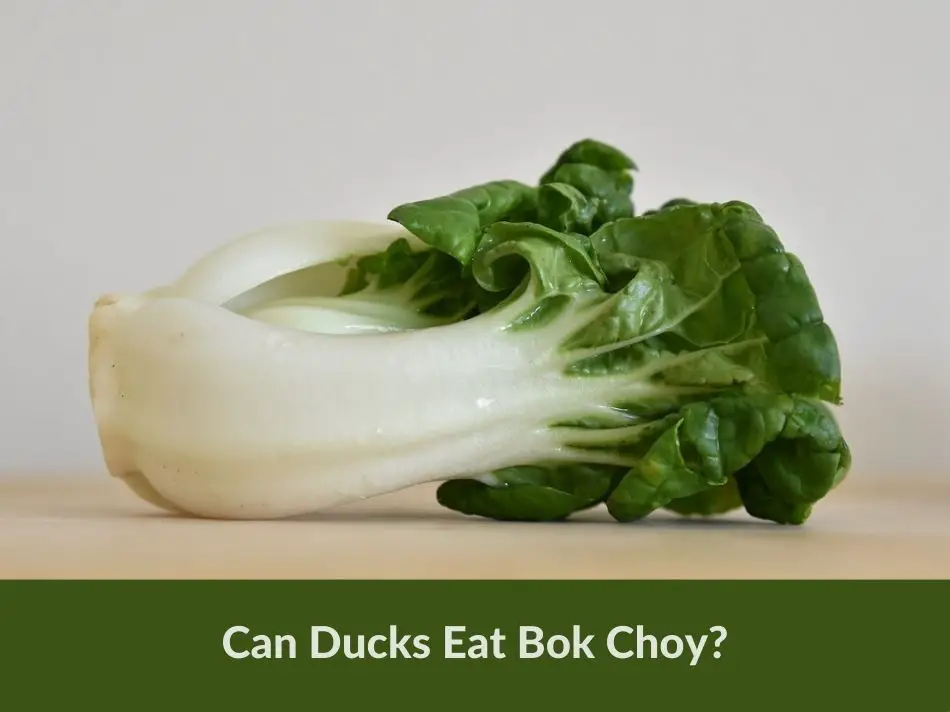In their natural habitats, ducks forage for a variety of foods, from aquatic plants to small insects and crustaceans. Domestic ducks, often fed by their caretakers, usually consume a diet of specially formulated duck pellets and grains. But, can ducks eat bok choy?
Yes, ducks can indeed eat bok choy. It’s a non-toxic and safe green for them. It’s packed with vitamins and minerals, making it a perfect snack for ducks.
In this article, duck enthusiasts and curious park visitors will discover the ins and outs of feeding bok choy to our quacking friends. From understanding a duck’s dietary needs to the specific benefits and methods of introducing bok choy into their diet, we’ll explore it all.
How Often Can I Feed My Ducks Bok Choy?
While bok choy can be a nutritious snack for ducks, it shouldn’t replace their main diet. It’s ideal to offer bok choy to your ducks once or twice a week, ensuring they still get a well-rounded diet from their regular feed.
Can Ducklings Eat Bok Choy?
Little feet and tiny beaks bring about a whole new set of concerns. Ducklings can nibble on bok choy, but their primary diet should be nutrient-rich starter feed designed specifically for them. If introducing bok choy to ducklings, ensure it’s finely chopped and easy for them to digest.
Bok Choy Nutritional Value
Below is the nutritional value of 100 grams of bok choy.
- Calories: 13
- Protein: 1.5 g
- Carbohydrates: 2.2 g
- Fiber: 1 g
- Sugars: 1.2 g
- Water: 95.32 g
It also contains several vitamins and minerals as listed below.
- Calcium
- Iron
- Magnesium
- Phosphorus
- Potassium
- Zinc
- Manganese
- Selenium
- Vitamin C
- Folate
- Vitamin A
- Vitamin K
Is Bok Choy Healthy for Ducks?
Absolutely! Bok choy is packed with vitamins and minerals beneficial for ducks. From Vitamin A, crucial for vision and feather health, to Vitamin K which aids in blood clotting. Just remember that while bok choy is healthy, it should complement their primary food source rather than replace it.
- Calcium: Vital for robust bones and eggshell formation in laying ducks.
- Iron: Essential for oxygen transport, influencing the reddish-orange hue of their feet and beak.
- Magnesium: Aids in muscle and nerve functions, helping ducks remain active and responsive.
- Phosphorus: Supports bone health and energy metabolism, fueling a duck’s active lifestyle.
- Potassium: Regulates heart rate and fluid balance, ensuring ducks are hydrated and healthy.
- Zinc: Promotes healthy feather growth, skin, and bill.
- Manganese: Important for bone formation, especially in growing ducklings.
- Selenium: Supports metabolism and acts as an antioxidant, protecting ducks from cellular damage.
- Vitamin C: Strengthens the immune system and aids in wound healing.
- Folate: Essential for early duckling development, particularly DNA synthesis.
- Vitamin A: Enhances vision, growth, reproduction, and skin health.
- Vitamin K: Ensures proper blood clotting, reducing the risk of excessive bleeding from injuries.
How To Feed Bok Choy To Duck
- Clean and Fresh: Ensure the bok choy is free from pesticides and wash it thoroughly.
- Chop It Up: Cut the bok choy into manageable pieces, especially if feeding ducklings.
- Hand Feed or Scatter: You can either hand feed the ducks (a delightful experience!) or scatter the bok choy pieces on the ground or water for them to forage.
- Hydration is Key: Whenever you feed ducks, always ensure they have access to clean water. Ducks need water to help them swallow and digest their food properly.
More Vegetables Ducks Can Eat
Ducks, with their versatile palates, can safely consume a wide variety of vegetables. From crunchy carrots to leafy greens, these feathered friends often appreciate the fresh crunch and nutritional boost that vegetables provide. Below are some more veggies that ducks can snack on.
Conclusion
Ducks, with their curious appetites, can safely indulge in bok choy treats. Also remember, whenever there’s food, there should be water. So, the next time you’re near a pond and thinking of sharing a snack, go ahead and offer them some bok choy and watch the joyous quacking that ensues!
Disclaimer: The information in this article is for informational purposes only. I'm not an expert or a veterinarian.


